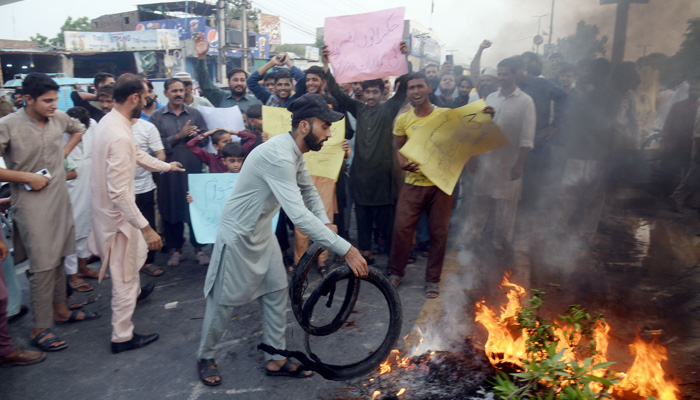PM's emergency meeting on inflated power bills bears no fruit
MQM-Pakistan fears protests could turn violent; Pesco seeks police security amid fears of vandalism
PESHAWAR/RAHIM YAR KHAN/HAFIZABAD/LAHORE: As protests intensify across the country against inflated electricity bills and runaway inflation for the third consecutive day, Caretaker Prime Minister Anwar-ul-Haq Kakar held an emergency meeting at his office today (Sunday) to mull relief measures for the masses.
Owing to protests in Peshawar, where agitated citizens have taken to the streets, the Peshawar Electric Supply Company (PESCO) has sought police protection amid fears of violence.
Back-breaking inflation has already left citizens apprehensive, but the increase in power tariff with bills and taxes going through the roof has forced them to stage protest demonstrations, demanding a reduction in the electricity bills and withdrawal of excess taxes.
The Ministry of Energy (Power Division) officials briefed the premier on the electricity tariffs and factors behind the massive increase in electricity bills.
In its letter to the Capital City Police Chief Syed Ashfaq Anwar, Pesco has requested the deployment of police personnel in seven sub-divisions including Khyber Circle, Hayatabad 2, Tajabad, Landi Arbab, Badaber and Deh Bahadur.
Agitated citizens, as mentioned in the letter, may enter these sub-divisions and vandalise the public property. It stated that in the current situation, law and order could be threatened.
"Pesco employees are in a state of panic," it added, seeking protection for employees and property.
Meanwhile, citizens staged a protest demonstration in Punjab's Rahim Yar Khan, blocking the main road while in the province's Chunian city angry power consumers blocked the Exchange Road and set their bills ablaze.
Protestors across the country demand a reduction in electricity tariffs and the removal of excess taxes in the utility bills, warning that they would not pay the bills if the demands were not met.
Traders, too, protested in Hafizabad by leading a rally from the city's Fawara Chowk to the press club. In Okara's Hujra Shah Muqeem, people came out for demonstrations as well. Protesters burnt electricity cables and raised slogans against the Water and Power Development Authority (Wapda) and the government.
Demonstrations by citizens and traders were also held in Faisalabad, Lahore, Risalpur, and Khyber Pakhtunkhwa's Nowshehra district against the hike.
Political parties including the Jamaat-e-Islami and Muttahida Qaumi Movement Pakistan (MQM-P) have condemned the hike and additional taxes on power bills.
MQM-P fears violence amid protests
MQM-P Convener Khalid Maqbool Siddiqui, in a presser earlier today, expressed fears that the protests could turn into riots.
"It is the responsibility of the government to take immediate relief measures," he said, speaking about the problems of power consumers in Karachi and Hyderabad.
"The pressure of circular debt is not on the owners of K-Electric, but on the consumers. Around 12 to 14 hours of loadshedding is being done in Hyderabad and the city's traders are being forced to protest," he added.
The politician said bills are the same, despite incessant and long hours of loadshedding.
In July this year, the federal cabinet — headed by then prime minister Shehbaz Sharif — had greenlit a massive increase in the base tariff of electricity by up to Rs7.50 per unit against the national average tariff determination of Rs4.96 by the power regulator National Electric Power Regulatory Authority (Nepra).
The regulator had hiked the tariff to increase revenue collection for the loss-making power distribution companies (Discos) during the current fiscal year. Nepra stated that the revised national average tariff for the 2023-24 fiscal year has been determined at Rs29.78 per unit kWh, which is Rs.4.96 per unit higher than the previously determined national average tariff of Rs24.82.
While the regulator cited the rupee’s devaluation, high inflation and interest rates, the addition of new capacities and overall low sales growth as reasons behind the increase, it was actually hiked to meet one of the conditions set by the International Monetary Fund (IMF) of introducing structural reforms in the energy sector.
However, the applicable tariff would be much higher after including surcharges, taxes, duties and levies, besides monthly and quarterly adjustments.
-
Security forces gun down 30 terrorists in multiple IBOs in KP: ISPR
-
MQM-P calls for new province in Sindh
-
US report validates Pakistan military edge over India: PM
-
Banned TTP poses serious threat to Pakistan security: UNSC panel
-
CM Afridi clarifies remarks on by-poll after ECP requests army deployment
-
Dubai sees 3.2m Pakistani passengers in 2025 as airport sets new milestone
-
Security forces kill 23 Indian proxy terrorists in KP's Kurram
-
Pakistan to construct island to boost oil exploration: report












